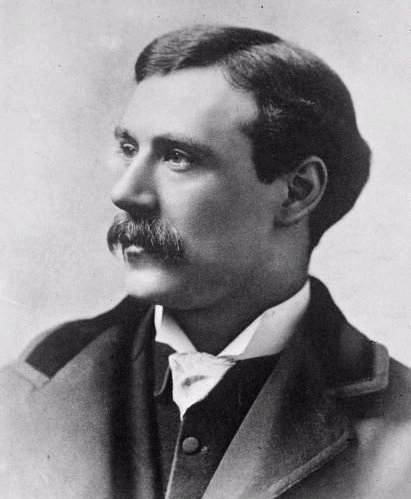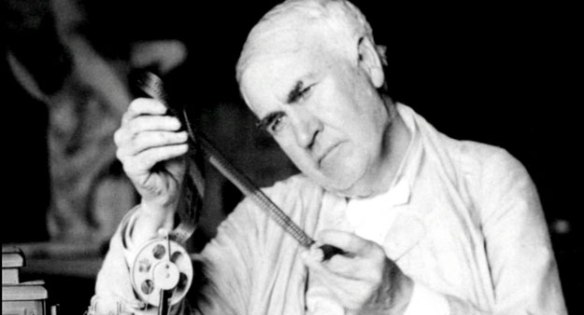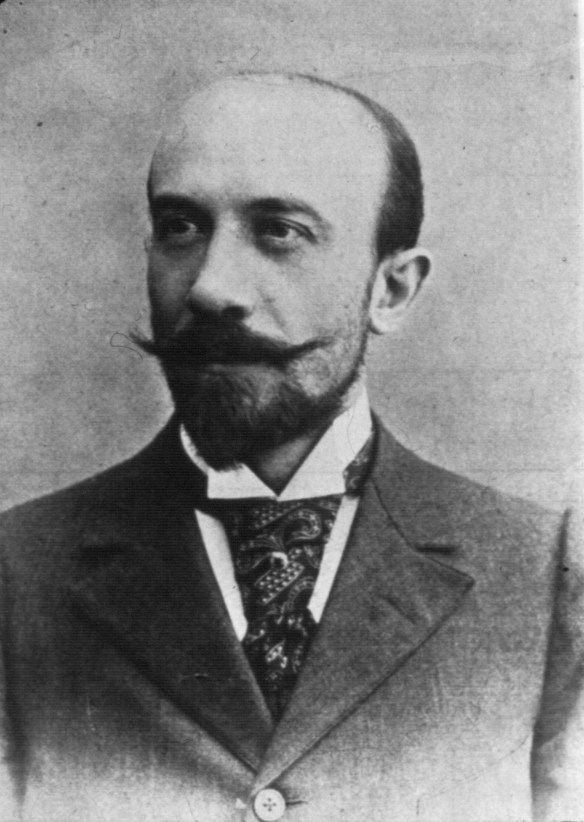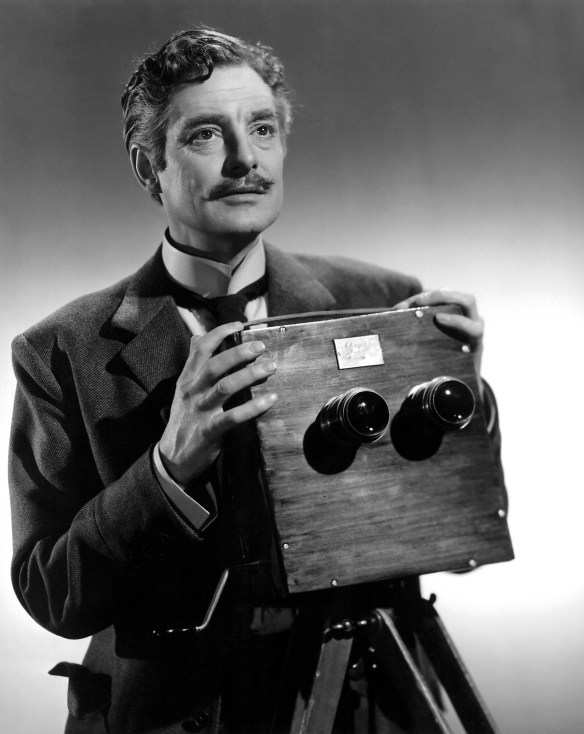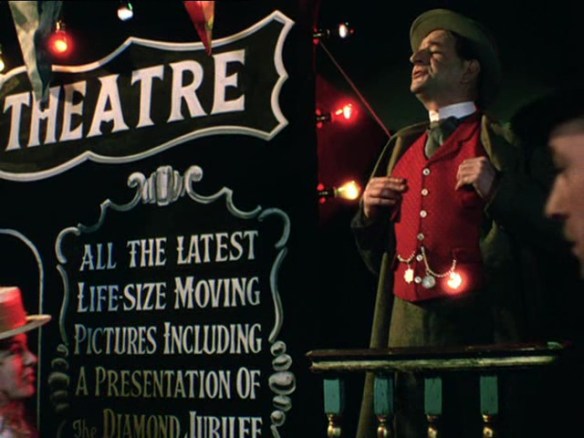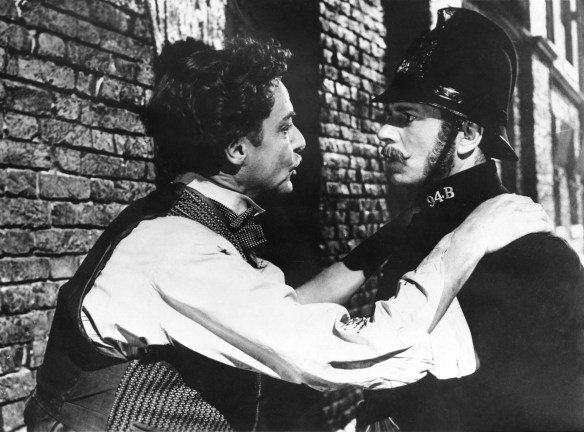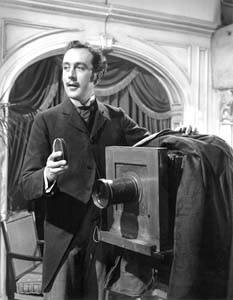
Robert Donat plays film pioneer William Friese-Greene in The Magic Box (1951), directed by John Boulting.
In the annals of forgotten inventors, unsung geniuses and visionaries who have fallen through the cracks of time, William Friese-Greene should be near the top of the list. Even though his gravestone bears the inscription, “The Inventor of Kinematography,” his reputation as an early film pioneer is still challenged by some movie scholars while others believe he was a victim of bad luck and deserved the credit and fame that others like Thomas Edison enjoy today. The Magic Box (1951), directed by John Boulting, favors the latter view and was one of the most prestigious productions of its year. It was produced exclusively for the Festival of Britain, a national exhibition that opened in London in May 1951 and marked the centenary of the 1851 Great Exhibition.
Even to this day, William Friese-Greene remains a shadowy, controversial figure whose life story is often sketchy with important details lost to time. From the various books, biographies and sources quoted on the internet, here is what is known. He was born in Bristol, England in 1855. As a young man, he became a photographer’s apprentice in Bath circa 1869 and eventually opened his own studio there, later expanding his business to Brighton and London.
After his marriage to Helena Friese in 1874, he changed his birth name of William Edward Green to William Friese-Greene in honor of his wife. While in Bath, he began working with John Rudge whose experiments with magic lanterns fired his imagination and led to a collaboration on a device called a Biophantascope which projected glass plate images. Friese-Greene soon realized this was an impractical medium for projecting moving pictures and turned to oiled paper and later celluloid in 1887 as a desirable medium.
By 1889, he was working with two engineers, Frederick Varley and Mortimer Evans, on cameras that could capture four to five pictures per second. The latter invention proved unsuccessful but Friese-Greene plowed ahead, experimenting with color cinematography that resulted in his Biocolour process. Unfortunately, he became embroiled in a lawsuit brought against him by his rival G.A. Smith, the developer of Kinemacolor. He lost the case but the decision was reversed in an appeal to the House of Lords in 1914. Yet Friese-Greene wasn’t able to profit from the decision since his Biocolour process was not yet perfected.  Although he spent endless hours tinkering and working on his ideas, he was a terrible businessman and often tended to forget about his family, friends, important dates or personal affairs. As a result, he was constantly in debt and his always restless, curious mind often lacked the focus to finish inventions he’d started or to patent them and renew the patents when they expired. (At one point he was imprisoned for failing to comply with the terms of his bankruptcy).
Although he spent endless hours tinkering and working on his ideas, he was a terrible businessman and often tended to forget about his family, friends, important dates or personal affairs. As a result, he was constantly in debt and his always restless, curious mind often lacked the focus to finish inventions he’d started or to patent them and renew the patents when they expired. (At one point he was imprisoned for failing to comply with the terms of his bankruptcy).
His first wife died young at age 21 in 1895 – they had a daughter – and he remarried in 1897. His second wife, Edith Harrison, bore him six sons but their life together was a series of mishaps and grinding poverty and she finally left him in 1917.
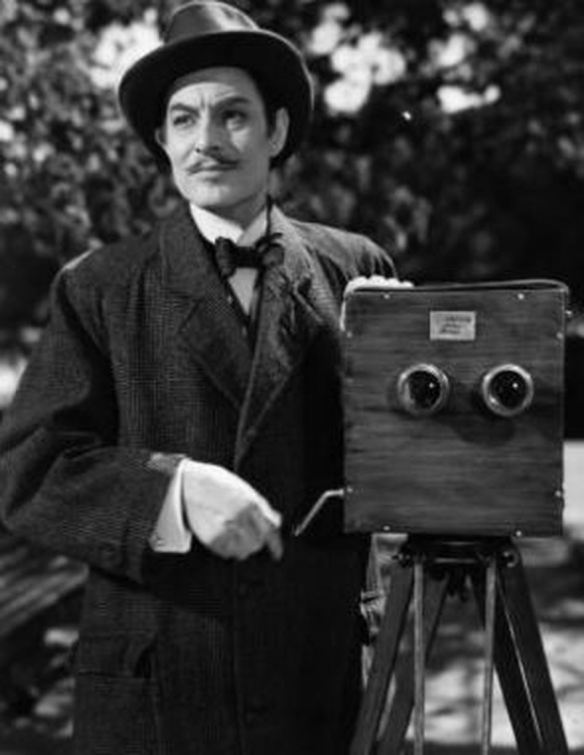
Robert Donat as obscure film pioneer William Friese-Greene in the 1951 British biopix, The Magic Box.
The first half of The Magic Box is told from Edith’s point of view and ends on the day that Friese-Greene departs for a British film industry meeting. It was there while making a speech that he became incoherent, fell over and died. Despite years of being ignored and forgotten, however, the film industry paid for his funeral (he was buried in Highgate Cemetery in London) and his monument, which credited him with being England’s first film pioneer. That claim has been debunked by many since, especially Brian Coe, curator of the Kodak Museum and author of The History of Movie Photography. At the same time, Friese-Greene had numerous defenders such as writer Ray Allister and film historian Will Day.
One wonders what the true story really was and if Friese-Greene actually superceded the Lumiere Brothers and Thomas Edison in the invention of the motion picture camera. Allegedly, he even sent a news story on his ‘chronophotographic’ camera in the British publication Photographic News in 1890 to Edison, the year before the American inventor was credited with building the Kinetoscope. And you have to wonder about Edison.
According to Remi Fournier Lanzoni in French Cinema: From Its Beginnings to the Present, “agents of Thomas Edison bribed a theater owner in London [in 1902] for a copy of A Trip to the Moon by George Méliés. Edison then made hundreds of copies and showed them in New York City. Méliès received no compensation.” Méliès had been counting on taking the film to America and recoup the huge cost of it by showing it there when he discovered that Edison had already distributed it, which bankrupted Méliès. It sounds to me like Edison was a pioneer in video pirating and theft. 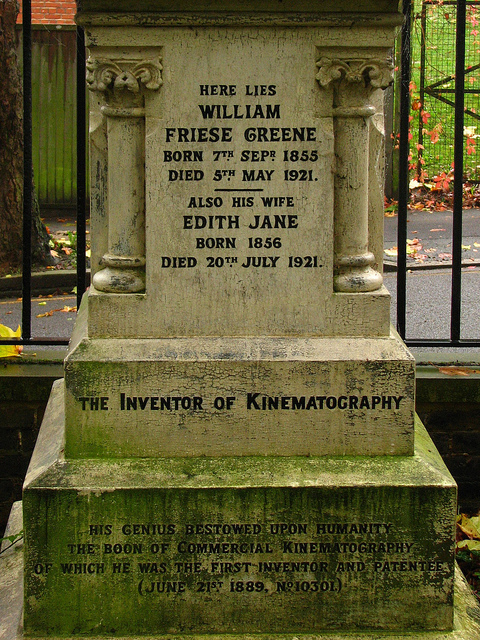 In all likelihood, Friese-Greene was probably ripped off and exploited by competitors in the same field all the time. In The Magic Box he always seems to be working on the next undiscovered breakthrough while others are getting credit for inventions he had already created some earlier prototype for…without receiving any recognition.
In all likelihood, Friese-Greene was probably ripped off and exploited by competitors in the same field all the time. In The Magic Box he always seems to be working on the next undiscovered breakthrough while others are getting credit for inventions he had already created some earlier prototype for…without receiving any recognition.
With Robert Donat cast as William Friese-Greene and an all-star cast featuring practically every famous star and character actor working in the British film industry (with the possible exception of Alec Guinness who refused), The Magic Box was a monumental flop at the box office which was perhaps further proof of Friese-Greene’s unlucky life and legacy. This was a shame because the film stands as an impressive and often dazzling visual achievement with Jack Cardiff’s not-of-this-earth Technicolor cinematography and immaculate art direction and production design by T. Hopewell Ash and John Bryan, respectively.
Many critics at the time found the movie highly romanticized and suspect as biography since it was based on Ray Allister’s non-fiction book, Friese-Greene, Close-Up of an Inventor, which was also accused of inflating the inventor’s importance and presenting unproven claims as proof.  Most film biographies, particularly Hollywood made features, have always played fast and loose with the facts so this is nothing new but The Magic Box is a special case. For one thing, it has a complex structure featuring two elaborate flashbacks, one from his second wife’s point of view and one from Friese-Greene which ends with his collapse at the aforementioned British film industry meeting in 1921. This is followed by a third viewpoint, a brief epilogue delivered by an impassive, unidentified narrator. If it’s possible for a biopic to be both highly nostaglic and relentlessly depressing at the same time, this is it.
Most film biographies, particularly Hollywood made features, have always played fast and loose with the facts so this is nothing new but The Magic Box is a special case. For one thing, it has a complex structure featuring two elaborate flashbacks, one from his second wife’s point of view and one from Friese-Greene which ends with his collapse at the aforementioned British film industry meeting in 1921. This is followed by a third viewpoint, a brief epilogue delivered by an impassive, unidentified narrator. If it’s possible for a biopic to be both highly nostaglic and relentlessly depressing at the same time, this is it.
There is an undeniable tension at work throughout The Magic Box due to a constant tonal clash from scene to scene. It makes you wonder if it was intentional on the part of director John Boulting and producer Ronald Neame. It’s as if William Alwyn’s rich, orchestral score and Jack Cardiff’s day-glo cinematography are at war with Eric Ambler’s literate, hard-edged screenplay and the subtle nuances of the performances. Yet, this strange dichotomy is what makes the movie so compelling to watch.  No, the problem with The Magic Box for most people is William Friese-Greene himself, the sort of beautiful dreamer who could see what others could not. Yet he was blind to those closest to him, unintentionally causing heartbreak, despair and financial ruin due to his oblivious nature and inability to deal with the day-to-day details of real life.
No, the problem with The Magic Box for most people is William Friese-Greene himself, the sort of beautiful dreamer who could see what others could not. Yet he was blind to those closest to him, unintentionally causing heartbreak, despair and financial ruin due to his oblivious nature and inability to deal with the day-to-day details of real life.
Take, for example, the scene where his second wife (Margaret Johnston), finally confronts the inevitable about her lot in life. Watching her husband leave the house for another long night in his laboratory, she says (in voiceover) “That night I realized something that perhaps I had known for a quite a long time. That although we might work as usual, and plan for the day when we were going to be successful, we weren’t going to be rich. As a family, we’d be lucky if we survived.”
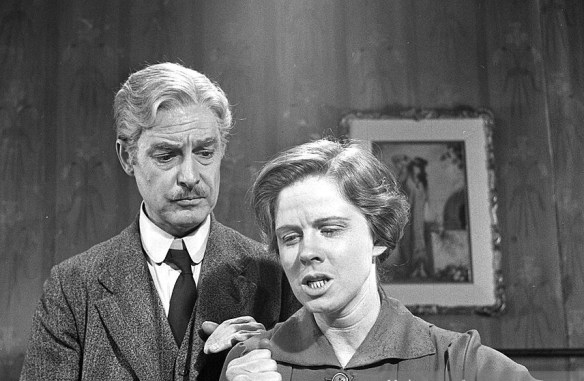
Robert Donat and Margaret Johnston in the tragic tale of film pioneer William Friese-Greene, The Magic Box.
Later, when she accepts the fact that the marriage is hopeless, she observes, “Nobody knows him anymore. He’s nobody that matters. Nobody cares for his opinion but Willie Friese-Greene hasn’t mattered for years. He doesn’t know that. Thinks he still belongs. I think the truth is when I met him his real life was already over. I never knew the real Willie. He was before my time.”
Even in Friese-Greene’s own flashback, he recalls how he drove his first wife to tears over his inability to keep important dates and appointments, particularly his commitment as a soloist in a local musical production; he fails to show up for the performance, of course, because he is busy conversing with a renowned inventor about movie cameras. The Magic Box might look like a romantic fantasy on the surface but with Eric Ambler’s tough-love scripting resulting in scenes like the above, it’s not a feel-good, uplifting tale of an artist’s triumph against all odds. It’s a haunting, melancholy portrait of someone who kept playing the game and losing all the while.
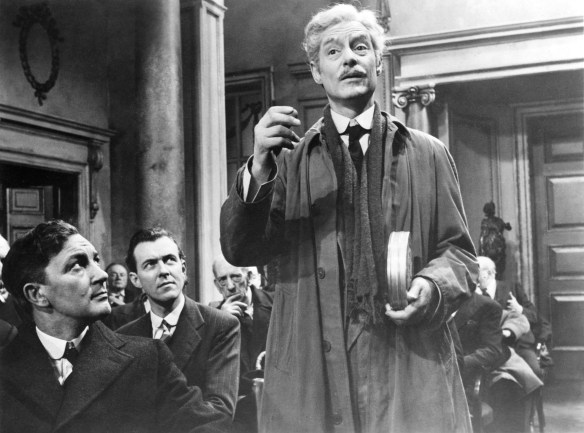
Robert Donat as cinema pioneer William Friese-Greene in his final days in the biopix The Magic Box (1951).
Donat, in particular, with his sad, soulful eyes and often haggard, physical appearance – even in his most upbeat, optimistic moments – is ideally cast as Friese-Greene. At the time, Donat was physically ill, having suffered from chronic asthma most of his life. By 1955 he was dependent on using oxygen whenever he worked and he died in 1958 at the age of 54.
According to one report, Donat was given Friese-Greene’s spectacles and purse by the family for use during the shooting of the film. Maria Schell, with her delicate, luminous beauty, is fine as the ill-fated Helena and Margaret Johnston is equally memorable as his despairing second wife (she is also excellent as the malevolent sorceress in Night of the Eagle aka Burn, Witch, Burn, 1962).
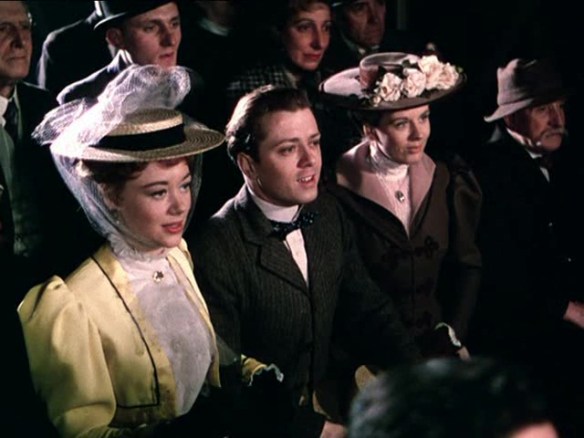
Glynis Johns & Richard Attenborough play supporting roles in the British biopix, The Magic Box (1951).
Most of all, The Magic Box is a treat for any Anglophile with its amazing all-star cast that includes Richard Attenborough, Michael Redgrave, Googie Withers, David Tomlinson, Janette Scott, Leo Genn, Stanley Holloway, Glynis Johns, Dennis Price, Eric Portman, Joyce Grenfell, Margaret Rutherford, Emlyn Williams and Laurence Olivier (who has an amusing cameo as a London bobby pulled off the street by the ecstatic inventor to witness the first demonstration of moving pictures). The list goes on and on.
Supposedly, Ronnie Kray, one of the Kray brothers (a pair of notorious London criminals), is an extra in the film. I also discovered that actor Richard Greene (The Little Princess, The Black Castle, The Castle of Fu Manchu and The Adventures of Robin Hood on TV) was the grandson of William Friese-Greene. Who knew?
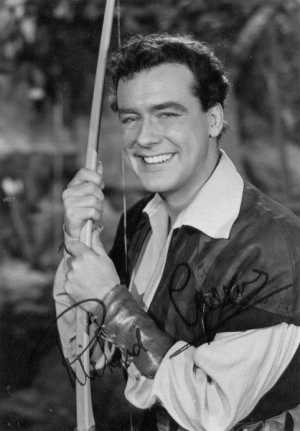
Actor Richard Greene as a Sherwood Forest legend in the 1955 TV series, The Adventures of Robin Hood.
In the end, Friese-Greene may well have been impossible and maddening to be around despite his brilliance – you have to pity his wives and children – but there will always be a special place in my heart for the beautiful losers and unknown dreamers of this world.
The Magic Box remains unavailable on Blu-Ray or DVD in the U.S. You can stream the film on Amazon but I can’t vouch for the quality and you might find an all-region DVD-R import or gray market copy on the internet. TCM has even shown it in the past and may air it again but, at this point, The Magic Box deserves a full restoration, if only for Jack Cardiff’s luminous Technicolor cinematography.
* This is a revised and updated version of a blog that originally appeared on Movie Morlocks, the official Turner Classic Movies blog.
Other website links of interest:
http://www.britmovie.co.uk/films/The-Magic-Box_1951
http://victorian-cinema.net/friesegreene
http://www.screenonline.org.uk/people/id/508948/

